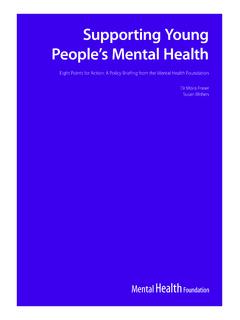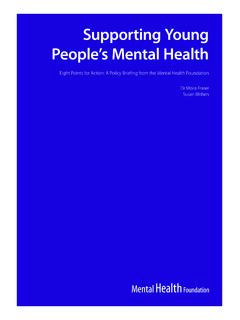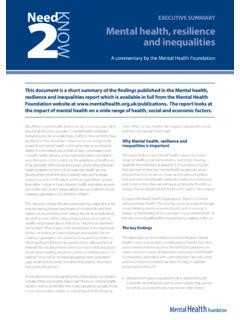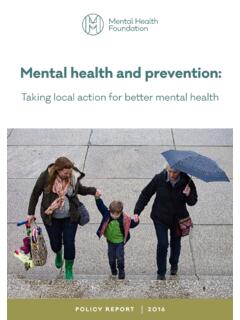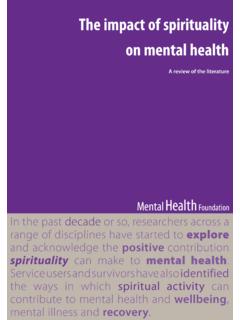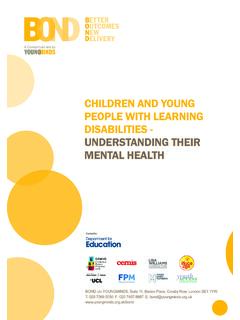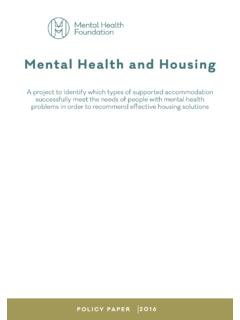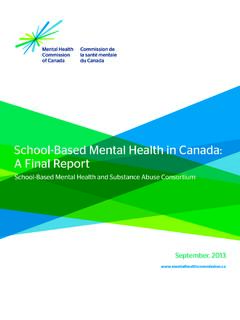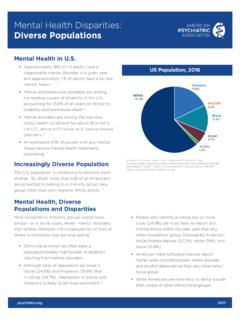Transcription of FUNDAMENTAL FACTS ABOUT MENTAL HEALTH 2016
1 1 FUNDAMENTAL FACTS ABOUT MENTAL HEALTH 20163 Acknowledgements: We acknowledge and thank all those who contributed to the preparation of this report: Jenny Edwards, Isabella Goldie, Iris Elliott, Josefien Breedvelt, Lauren Chakkalackal, Una Foye, Amy Kirk-Smith, Jodie Smith, Steliana Yanakieva, Zaariyah Bashir and Jess Amos. We would also like to thank our funder The Constance Travis Charitable citation: MENTAL HEALTH Foundation. (2016). FUNDAMENTAL FACTS ABOUT MENTAL HEALTH 2016. MENTAL HEALTH Foundation: London. 3 ContentsForeword 5 Introduction to the 2016 edition of FUNDAMENTAL FACTS 7 Glossary of terms 101.
2 The extent of MENTAL HEALTH problems The prevalence and impact of MENTAL HEALTH problems What are the main types of MENTAL HEALTH problems? Suicide and self-harm Challenging myths and stereotypes: Violence and MENTAL HEALTH 272. Differences in the extent of MENTAL HEALTH problems MENTAL HEALTH across the lifetime Family and parenting Children s and young people s MENTAL HEALTH Adult MENTAL HEALTH Older adults Older adults and MENTAL HEALTH Factors contributing to older people s MENTAL HEALTH Other groups experiencing a higher prevalence of MENTAL HEALTH problems Black, Asian and minority ethnic groups Refugee, asylum-seeking and stateless people Disability Learning disability Physical disability Sensory impairment Lesbian, gay, bisexual and/or transgender Carers Domestic violence Complex needs and multiple disadvantages Homelessness The prison population Substance misuse and dependence 55453.
3 Social factors associated with MENTAL HEALTH problems Introduction Social determinants of MENTAL HEALTH Poverty and disadvantage Debt Unemployment Housing and environment Inequality as a determinant of MENTAL HEALTH Social support and relationships Family and childhood Couple relationships Community 624. Prevention, treatment and care Prevention and early intervention Interventions during childhood, early years and in school settings Early intervention and psychosis Prevention and the workplace Suicide prevention How many people seek help and use services? Extent of treatment and care MENTAL HEALTH legislation Treatment and care modalities 745. The cost of MENTAL HEALTH problems Overall global and nationwide costs of MENTAL HEALTH problems Economic and societal costs MENTAL HEALTH research costs MENTAL HEALTH investments and divestments 88 References 89 Foreword45 This year s FUNDAMENTAL FACTS follows the recent publication of the 2014 Adult Psychiatric Morbidity Survey (APMS).
4 This highlights that, every week, one in six adults experiences symptoms of a common MENTAL HEALTH problem, such as anxiety or depression, and one in five adults has considered taking their own life at some point. Nearly half of adults believe that, in their lifetime, they have had a diagnosable MENTAL HEALTH problem, yet only a third have received a diagnosis. The APMS brings to the fore the widening gap between the MENTAL HEALTH of young women and young men. Women between the ages of 16 and 24 are almost three times as likely (at 26%) to experience a common MENTAL HEALTH problem as their male contemporaries (9%) and have higher rates of self-harm, bipolar disorder and post-traumatic stress disorder. This is clearly an issue that needs a deeper look and a strategy for addressing the factors that are causing it.
5 Another group at particular risk includes people in mid-life, with a noticeable increase in the prevalence of common MENTAL HEALTH problems for both men and women between the ages of 55 and 64. There are some very worrying levels of poor MENTAL HEALTH among people receiving Employment and Support Allowance. Two thirds report common MENTAL HEALTH problems and the same percentage report suicidal thoughts, with having made a suicide attempt and one third ( ) self-harming, indicating that this is a population in great need of targeted an increase in people accessing treatment, around a third of all people with a MENTAL HEALTH problem have sought no professional help at the centre of the MENTAL HEALTH Foundation s research and programme work is the belief that many MENTAL HEALTH problems are preventable.
6 There is far more scope for interventions that reduce the incidence of people developing MENTAL HEALTH problems and also support recovery. There are Foreword67solutions that we know are not yet being commonly applied, as well as gaps in our knowledge that need to be filled. The Foundation sees its role as being to address both the knowledge gap and the implementation demographic inequalities in the prevalence and risks associated with MENTAL HEALTH problems are reflected in treatment. People who are white British, female or in mid-life are more likely to receive treatment, while people in black ethnic groups have particularly low treatment rates. People with low incomes are more likely to have requested but not received MENTAL HEALTH often, we approach MENTAL HEALTH problems by considering what individuals, families and communities are lacking.
7 It is far more productive to use approaches that build on the knowledge, skills and relationships within communities. We believe that the right information, co-created and communicated through the right channels, can engage people and motivate them to have greater understanding of MENTAL HEALTH , to see how we can all take steps to reduce our risks of becoming ill, and to advocate service and policy change to support good MENTAL HEALTH . We intend for FUNDAMENTAL FACTS to help us answer the question: What can we do, both individually and collectively, to improve MENTAL HEALTH in our society?Public information is at the heart of what we do. Our online A Z at is consulted by hundreds of thousands of people every year and FUNDAMENTAL FACTS is one of our most popular FACTS is a resource for everyone interested in good MENTAL HEALTH and preventing MENTAL HEALTH problems from developing.
8 Please share it and help us to advocate a prevention revolution in thinking ABOUT MENTAL Edwards CBE Chief ExecutiveMental HEALTH Foundation10mm10mm10mm10mm10mm10mm10mm10 mm10mm10mm67 The MENTAL HEALTH Foundation has a vision of a world with good MENTAL HEALTH for all. To achieve this, we aim to help people understand, protect and sustain their MENTAL HEALTH . Central to this is the need for evidence and data that can help us to answer the questions asked ABOUT MENTAL HEALTH by a wide range of people not only professionals and service planners, but also people with experience of MENTAL HEALTH problems, communities that experience high levels of MENTAL HEALTH inequity, politicians and the media. To help people understand MENTAL HEALTH , we have committed to creating FUNDAMENTAL FACTS on a regular basis to illustrate that, while we still have a lot to learn ABOUT MENTAL HEALTH , there is a lot ABOUT MENTAL HEALTH that we know and can act on now.
9 The first FUNDAMENTAL FACTS was produced in 2007 to mark the landmark APMS in Since 2015, FUNDAMENTAL FACTS has become a regular publication by researchers at the MENTAL HEALTH Foundation. This 2016 edition of FUNDAMENTAL FACTS has been created to coincide with the release of the newest APMS results from England. The findings of the 2014 APMS show that, for most MENTAL HEALTH problems, rates have either remained unchanged since 2007 or have deteriorated over time. However, the rates of individuals seeking and receiving treatment have risen significantly since the 2007 survey, with over a third of individuals with symptoms of a common MENTAL HEALTH problem receiving treatment. In addition to the full UK report, this edition highlights the publication of a FUNDAMENTAL FACTS for each of the devolved nations in the UK, as we recognise that Northern Ireland, Scotland and Wales have unique HEALTH and social care structures and MENTAL HEALTH needs.
10 With each publication, we aim to strengthen the range of statistics that we the UK s leading public MENTAL HEALTH charity, we draw together not only illustrative statistics on conditions and services, but also figures relating to the social, political and economic factors that impact on MENTAL HEALTH . FUNDAMENTAL FACTS now also provides the statistics that inform readers ABOUT MENTAL HEALTH equity, with the inclusion of information on protected characteristics and socioeconomic status and MENTAL to the 2016 edition of FUNDAMENTAL FactsiThis study is the source of the statistic that 1 in 4 people experience MENTAL HEALTH problems in any year. The Foundation s 2016 FUNDAMENTAL FACTS report will present the findings of England s 2014 APMS published in September 2016.
